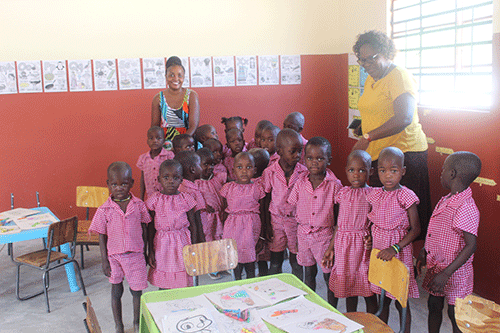Otjomuru Primary School principal is concerned about parents abusing their children’s social grants, and teachers of the school have resorted to buying uniform and toiletries for marginalised learners.
“There are over 300 learners at school but not all kids are getting social grants. Those who are getting social grants, their parents misuse their money on unnecessary things, such as alcohol,” said Anna Tjazapa.
She explained that in 2021, she reported the matter to the gender ministry in the region and the officials came in to talk to the parents.
“The situation is still the same. I do not know what kind of intervention the government can take to ensure these kids enjoy the benefit they get from the government,” she explained.
The marginalised children are receiving N$500 per month from the government to cater for their social well-being. Some of the parents who received the money on behalf of their children allegedly left the area and are nowhere to be found.
“I also wrote a letter concerning 11 children who appear vulnerable and come to school with no basic needs to the ministry last year but no improvement. As a result, we came up with a strategy to buy uniforms for the pre-primary first and then others follow,” she said.
New Era found some vaseline containers in the pre-primary class, which the principal and teachers bought to apply for learners.
“You see they all look clean and smart. They dress the uniforms as soon as they arrive in class and remove them at the end of the class. They do not go with them after school because they will get lost. Parents will not take care of them,” she explained.
Although the school has tried to look for uniforms, the learners do not have shoes or socks.
“We are in a mountainous area, and it gets cold here. They need shoes and socks. The little ones are vulnerable to the cold weather – that is why we tried to cover them. They only show up at school wearing a piece of cloth,” she said.
Tjazapa has now appealed to the good samaritans to come to the children’s rescue by donating uniforms and shoes before winter approaches.
At Otuani, a parent, Katjitjeme Tjihange, also raised similar concerns about parents abusing social grants meant for marginalised children.
“Some learners are receiving financial support from the government but their appearance shows they are living in unbearable conditions,” he said.
The director of the gender ministry in Kunene Connie Manghono confirmed visiting the school regarding the situation, however indicating that the programme meant for marginalised people is not reaching its objectives.
She said most of the guardians do not understand the importance of education.
“The programme is not meeting its expected objectives. There is a dependency syndrome in our people, which makes it difficult to use the resources at their disposal for something meaningful that will sustain them in future,” she explained.
However, the Ovatwe parents who spoke to New Era explained the money is not sufficient to sustain the children and family at large, as the government does not provide them with food any more.
“The government has stopped giving us food. As a result, we share the little they are giving our children with a maize meal bag to ensure the children are not starving,” said Tjikunde Tjirunga.
The headman for the Ovatwe camp in Otjomuru, Hondo Koviua, concurred with Tjirunga, saying his people are starving and depend only on social grants.
“The government disappeared without telling us anything. How do you expect us to survive if not by using the money our children receive,” he questioned.
A mother of five children: two at Otjomuru Primary School and three at home, Muatenganatjo Tjisuta, said her two children earn the social grants only those who are attending school.
“At least those two are at school. We share 200 for their needs and the rest for food. They can’t be in school all of them because the money is not enough,” she explained.


